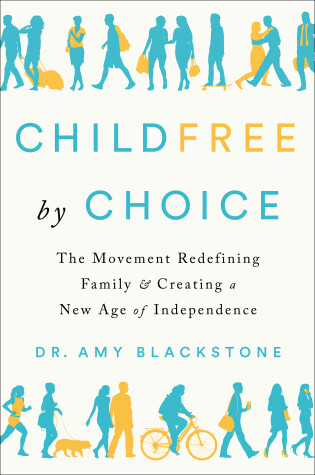
From Dr. Amy Blackstone, childfree woman, co-creator of the blog we're {not} having a baby, and nationally recognized expert on the childfree choice, comes a definitive investigation into the history and current growing movement of adults choosing to forgo parenthood: what it means for our society, economy, environment, perceived gender roles, and legacies, and how understanding and supporting all types of families can lead to positive outcomes for parents, non-parents, and children alike.
As a childfree woman, Dr. Amy Blackstone is no stranger to a wide range of negative responses when she informs people she doesn't have--nor does she want--kids: confused looks, patronizing quips, thinly veiled pity, even outright scorn and condemnation. But she is not alone in opting out when it comes to children. More people than ever are choosing to forgo parenthood, and openly discussing a choice that's still often perceived as taboo. Yet this choice, and its effects personally and culturally, are still often misunderstood.
Amy Blackstone, a professor of sociology, has been studying the childfree choice since 2008, a choice she and her husband had already confidently and happily made. Using her own and others' research as well as her personal experience, Blackstone delves into the childfree movement from its conception to today, exploring gender, race, sexual orientation, politics, environmentalism, and feminism, as she strips away the misconceptions surrounding non-parents and reveals the still radical notion that support of the childfree can lead to better lives and societies for all.
It's always a little bit harder for me to discuss non-fiction books I've listened to on audio; My audio comprehension is still not a match to my reading comprehension and I'm not quite as able to recall the details as well.
Even so, this book was eye opening for me. MT and I are child free by choice, and I've definitely experienced the bog-standard lines: you'll change your mind and it's different when it's yours and it's not too late, as well as the arguments for more exciting holidays and built-in old-age care. (All of which are fallacies: I almost never change my mind about anything, I'd feel no different if 'it' was my own, and at 49, which is the last time the 'not too late' argument was used, it's categorically too late, if not medically, then rationally. And while I'm willing to concede that some holidays might be more fun, there's no guarantee that anyone's children won't stick them in an old-age home when the time comes. Harsh, but true.)
But I've never experienced the vitriolic rhetoric aimed at us as a group; an upside to having always avoided the Editorial/Opinion section of the news, I guess. Wow. People need to worry less about what everyone else is doing and look inward; if these pundits have time to turn themselves inside out about other people's life choices, they have too much free time on their hands and not enough perspective on actual, real world issues.
As I was listening to this book and thinking "how have I missed all this nonsense, and who do I thank for that?" it started to niggle at me that, actually, I might have been on the receiving end of some of the blowback to choosing child free, I've just never acknowledged it as such. Not from a professional standpoint; frankly, I think my bosses were all too happy I'd not be taking maternity leave to be fussed about my rebellion against my (apparent) civic duty. But personally, socially ... that becomes trickier. Have I lost friends after they had kids? Certainly. MT and I used to have a much more jam-packed social calendar, until friends started spawning and we lost touch with more and more of them. But I can't say with any certainty that it's because we chose not to have kids; the toll newborns take on couples, then the non-stop demands of toddlers, could explain a lot of it. The medical issues that have necessarily slowed both MT and I down certainly are to blame for some of it too. But I can't be sure our choice not to have kids isn't at play either. Both my best friends have kids, and I never lost touch with either of them - in fact I was a huge part of first 10 years of one of the kids' lives, until I moved down under.
Anyway, the takeaway here is that the book has left me with things to chew on, and it certainly opened my eyes to societal reactions to those who choose to not procreate. So in that sense, the book was an outstanding success. It was, however, a dry read; very much structured like a dissertation that's been fleshed out for publication. I think the narrator of the audio helps overcome that a little, though it's still by no means a riveting read. MT overheard it when I was listening while gardening, and he though I was listening to the news.
I was also constantly jarred by her use of fertility; no question she's using it exactly the way it should be used, but to me fertility has always meant the ability to procreate, while in this book she uses it to refer to actual birthing of children, ie the fertility rates dropped during the global economic crisis to her means people stopped having children during the GFC. I kept thinking 'what does the GFC have to do with ability to conceive?'. That's my shortcoming though, not the author's.
All in all it was a very worthwhile read for me. Depending on one's level of engagement in this issue, individual results may vary. I will end this with saying it's a good book for anyone - with children or without - interested in the values and reactions society places on people when it comes to planning the future of their families.
Reading updates
-
Started reading
-
15 October, 2019:
Finished reading
-
15 October, 2019:
Reviewed
